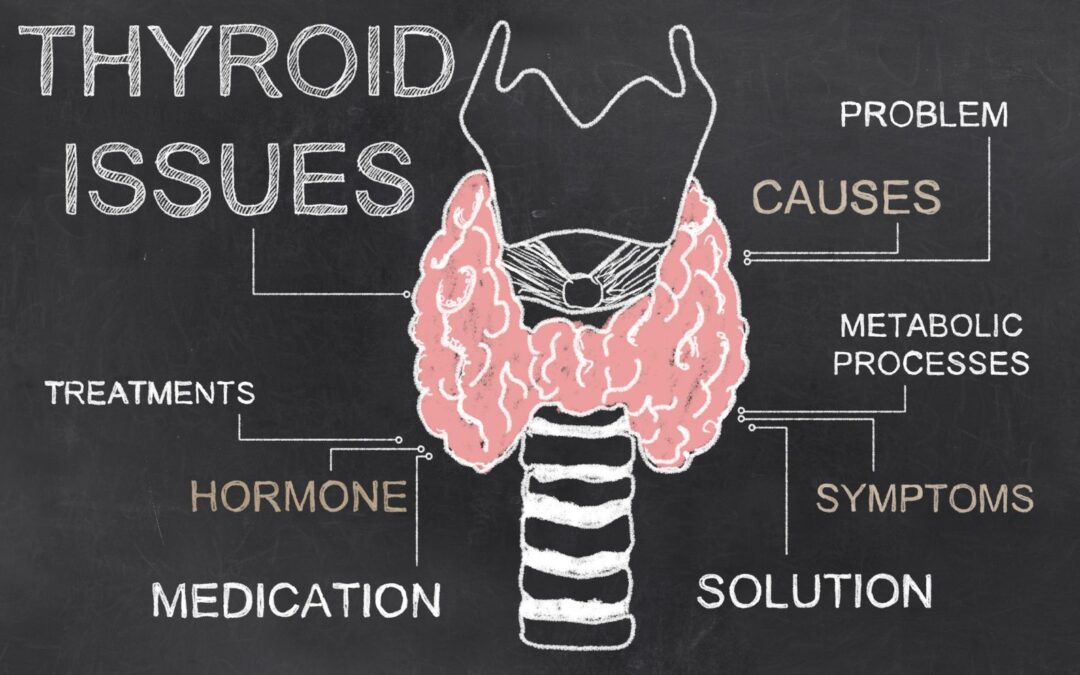 Thyroid
Thyroid
The thyroid gland is composed of two lobes that bestride the windpipe in front of the neck. The two hormones produced by the thyroid T4 and T3 – the numbers denoting the number of iodine atoms – have different functions.
T4 is inactive, circulating in the blood until it is broken down by enzymes to T3, the active thyroid hormone which enters the cells such as the bones, heart, liver, etc. When T4 is getting low in the blood, the pituitary gland is activated to secrete TSH, also known as thyroid stimulating hormone. This is the hormone that, when released from the pituitary, tells the thyroid to make more T4 and T3, which again enters the blood.
The Heart
Along their journey through the bloodstream. T4 and T3 will eventually meet up with the organs of the body they are created to work upon. For example, on the surface of the heart are areas called receptor sites, which are designed specifically for T3 to enter the heart and activate the mechanism that tells the heart how fast to beat. T3 can do this because it can enter the nucleus of a cell through the action of a special binding protein. This results in DNA transcription, which is instructions for the heart.
are designed specifically for T3 to enter the heart and activate the mechanism that tells the heart how fast to beat. T3 can do this because it can enter the nucleus of a cell through the action of a special binding protein. This results in DNA transcription, which is instructions for the heart.
High cortisol levels, gluten sensitivity, a sluggish liver, and wide fluctuations in blood sugar all contribute to thyroid problems.
 The Liver
The Liver
The liver is the largest gland in the body, probably because it performs many hundreds of important functions. One of its jobs is to convert T4 to T3, the active thyroid hormone responsible for regulating our metabolism, our body temperature, and our energy. If the liver is overloaded from the effects of stress, for example, excess cortisol from the adrenals, this is a case of congestion and happens because cortisol also fits in the receptor sites on the liver in the same way T3 does but doesn’t function at all.
Hormones are like messengers. They travel to different parts of the body where they have a job to do. When there are chronically high levels of cortisol from stress, normal detoxification activities get cut off, at least for a while. When there is too much T3 in circulation because the liver could not receive it, because cortisol has taken T3’s place in the liver, the pituitary will not be signaled to produce TSH, which is the thyroid stimulating hormone, which tells the thyroid to produce more thyroid hormone and ultimately our energy. This is one possible reason why people with hypothyroidism experience great fatigue, but in many cases it’s not a problem with the thyroid gland at all.
The Adrenals
When any kind of stress arrives on the scene, the adrenal glands, which sit atop each kidney, will start producing the stress hormone cortisol in order to send messages to particular body systems. A small increase in cortisol production is normal and healthy, but prolonged elevated levels of cortisol can have troubling effects. For example, high cortisol levels tend to depress the thyroid, which affects other body systems like the heart, the liver, and the bones. This is why a woman might have palpitations during and after menopause, when the hormones tend to get a little wacky and unbalanced. Or digestive problems due to increased cortisol to the liver or osteoporosis as prolonged and increased stress and cortisol levels trigger removal of calcium from the bones.
depress the thyroid, which affects other body systems like the heart, the liver, and the bones. This is why a woman might have palpitations during and after menopause, when the hormones tend to get a little wacky and unbalanced. Or digestive problems due to increased cortisol to the liver or osteoporosis as prolonged and increased stress and cortisol levels trigger removal of calcium from the bones.
The Effects of Stress
Let me briefly illustrate how the adrenals work to regulate body systems, and you’ll get a better idea of the effects of stress. All glands, but especially the adrenal and thyroid glands, are responsible for the energy of the human body. When the adrenals are triggered by any type of stress, they make the hormone cortisol. Cortisol’s main role is to increase blood sugar, and it also causes a rise in other hormones such as thyroid and insulin. This increase in blood sugar ensures that the brain and other vital systems can handle stressful situations.
There are many physiological processes that go on here, like calcium leaching from the bones and hypoglycemia, but those topics need their own article.
The Thyroid/Blood Sugar/Cortisol Loop
Higher than normal blood sugar is a healthy response during a stressful event. This is how the body goes into alert and prepares for the task at hand. But if you’re under chronic stress, your cortisol levels are probably always high, which keeps your blood sugar high and interestingly, vice versa. In science, this is known as a positive feedback loop, and the human body has many of these regulatory mechanisms. The main point I want to make here is that when the adrenals have been pumping out cortisol, they get fatigued and so do we.
Next, I’m going to talk about the thyroid and its hormones, as well as the part that blood sugar levels play in gluten sensitivity and adrenal fatigue. I also sneak the liver in, and what happens to thyroid hormone T3 when there are chronically high levels of cortisol in the body.
Cortisol replaces T3 in the cells (watch video below). T3’s job basically is to give signals to certain cells to perform a function, but under certain conditions is prevented from doing its job. The endocrine system is composed of glands that produce hormones. Hormones are like messengers. They travel to different parts of the body where they have a job to do. When there are chronically high levels of cortisol from stress, the liver’s normal detoxification activities get cut off, at least for a while.
One sound piece of advice I can give you that hardly anyone can argue is to limit or eliminate completely highly processed foodstuffs. I only half kiddingly call processed food predigested food, since it doesn’t take much for your body to turn a refined, highly processed product into sugar. In fact, all carbohydrates are also turned into sugar. And we know stress and cortisol raise blood sugar. If you’re gluten sensitive, this adds more stress and creates more cortisol production, raising blood sugar.
Insulin
Enter insulin, the fat hormone. Insulin’s job is to transport the sugar that’s in circulation in the blood to the body’s, tissues and organs for their energy needs. Just like T3, insulin may be prevented from dropping off the sugar, but in this case it’s because there is just too much sugar to be processed, and the cells that would have benefited from the energy become resistant, mainly to insulin.
Kind of like the scenario we hear about. With antibiotic resistance. Too much use and antibiotics become ineffective after a while.
The final blow happens when insulin, having no place to go, travels to the liver, where it is turned into fat and stored. High cortisol levels contribute to fat around the belly, and thyroid hormone depletion from chronic stress all work to ensure we feel physically tired and mentally foggy all the time.
Food Cravings
If you’ve ever gone on a weight loss diet, you know that when you get a craving, it’s a battle and the craving usually wins. Not anymore, now that we are beginning to get the picture.
There are sound physiological reasons why people have cravings, and sound scientific solutions to getting rid of them. But first, a few basics…
Did you know that when blood sugar goes up after eating a meal, insulin goes up more and stays higher in the blood? Insulin’s job is to take the sugar in the blood to the cells that need energy. When the sugar is gone from the bloodstream, the extra insulin, which is a hungry hormone, starts looking for sugar. This is felt by us as cravings.
And did you know that insulin converts nearly half of the carbohydrates we eat into fat for storage? Or that if you are eating too many fats, especially sweets, breads, actually too much of anything you probably have a hyper-insulin problem.
Cholesterol
Remember when I discussed two thyroid hormones when I said T3 from T4 was the active thyroid hormone responsible for metabolism and bringing energy to the cells, and cortisol production by the adrenals, that helps us manage stress. These processes begin in the brain, which sends signals to the glands to create more hormones from cholesterol.
One of the jobs of T3 is to break down cholesterol, explaining why high cholesterol is seen with a low functioning thyroid. When insulin peaks and then drops again because all the sugar in the blood is transferred to the cells, the adrenals are signaled to make more cortisol to raise blood sugar, which is one of its main jobs. T3 conversion is diminished because the brain is not able to communicate properly to the gland what its output should be.
In other words, high, low, fluctuating blood sugar and insulin levels perpetuate the cortisol response, which contributes to fat around the belly, and the insulin response which distributes fat everywhere else in the body, in addition to other problems caused by these hormonal imbalances.










